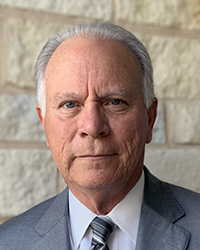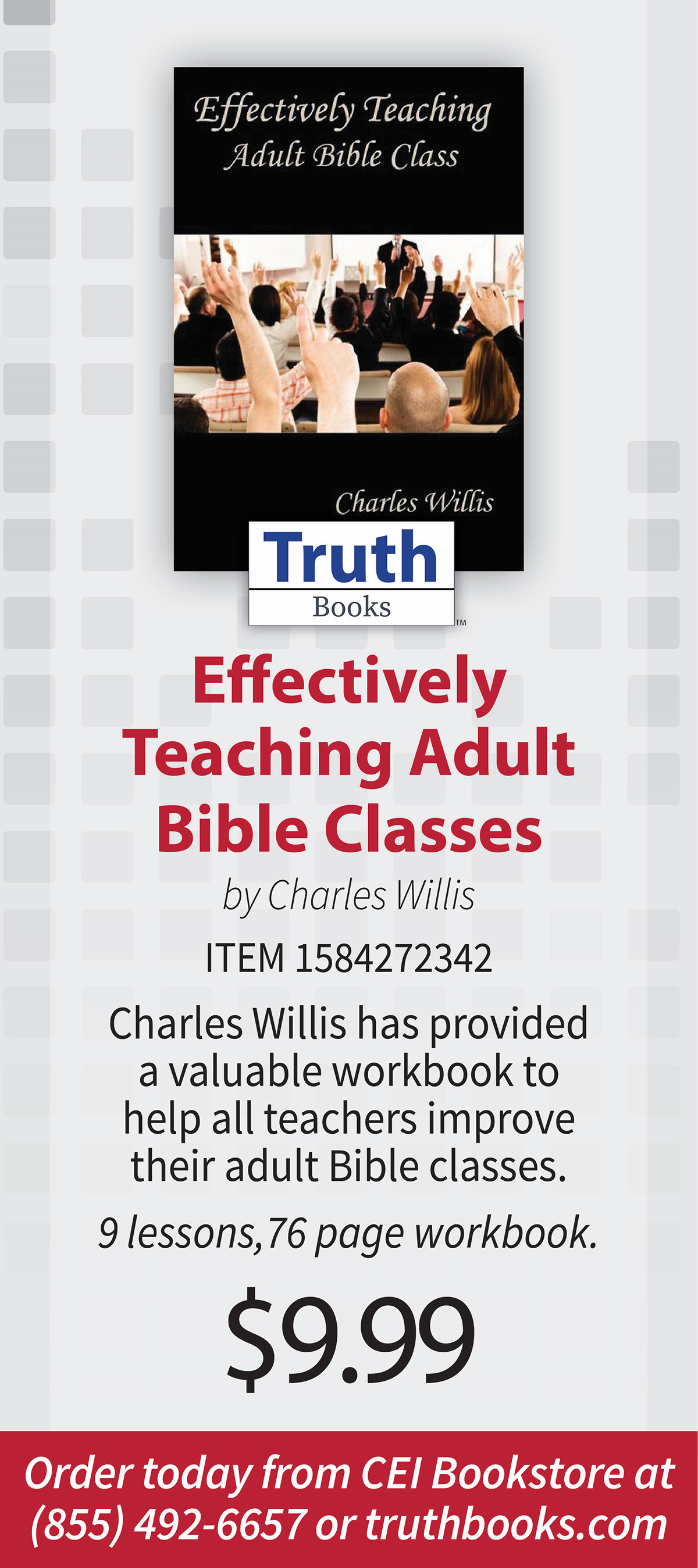

by Rubén C. Amador
Synopsis: To Bill H. Reeves, mentoring was more than an inclination, more than a thought—it was a godly textbook life.
New Testament Scriptures contain several exceptional partnerships of men who followed the Way of Christ. The companionship of the apostle Paul and the young man Timothy stands out among those recorded in Scripture. Reading the record carefully, you get to know the two men and their labors as motivated by their faith. Paul was the teacher, the mentor. Timothy was the student, the mentee.
Luke touches with conciseness the beginning of Paul and Timothy's partnership (Acts 16:1-5). It was based on their common faith, joint discipleship, and mutual goals. Throughout the record of Paul's labors, Timothy appears from time to time. Paul wrote Timothy two personal and exhaustive epistles, pressing him to "continue in the things" that he had learned from his mother Eunice, his grandmother Lois and Paul himself (2 Tim. 3:10-17). Timothy is mentioned favorably and generously in several of Paul's epistles to local churches. Writing to the church in Corinth, Paul says of Timothy, "He does the work of the Lord, as I also do" (1 Cor. 16:10-11). In his epistle to the Philippians, Paul expresses his strong faith in Timothy when he wrote, "I have no one likeminded, who will sincerely care for your state. For all seek their own, not the things which are of Christ Jesus" (2:19-24). Paul openly and confidently praised Timothy's life and work. Furthermore, Paul instructed the brethren not to despise Timothy (1 Cor. 16:11) and exhorted Timothy not to allow the brethren to despise him (1 Tim. 4:1-16).
However, the New Testament Scriptures nowhere chronicles any spoken word of praise on the part of Timothy toward Paul, the apostle. Nada. The Scriptures are silent. Nevertheless, Timothy did speak! Timothy spoke "sound words" entrusted to him by Paul, the apostle, based on the pointed instructions that he received from Paul. Along the way, Paul expressed his confidence in Timothy that he would do as Paul had instructed him. Paul based his assurance in Timothy on his fulfilling and accomplished labors. Nowhere do we read of Paul stating a disappointing or negative word about Timothy's life or work. We know nothing else of Timothy's life and work, we can speculate that with his powerful, remarkable beginning and mentoring, Timothy reached spiritual maturity in grandeur fashion. He had an outstanding example to emulate.
The Scriptures point to Paul as a true mentor to Timothy. Paul wrote: "To Timothy, a true son in the faith" (1 Tim. 1:2) and later, "To Timothy, a beloved son" (2 Tim. 1:2). They were like father and son, of the same mind (1 Cor. 4:17). Paul was also a mentor to Titus, and others mentioned (or not mentioned) by name. However, none are as intimate and singular as with Timothy: the older mature and tried soldier with the younger selfless apprentice.
In the late 1950s, a young man in his early preaching life held a gospel meeting with the Spanish-speaking church in Sinton, Texas. On Sunday morning, after the assembly, I reached out to shake his hand. This young preacher said, "Rubén, you have to be a preacher one day." Those spoken words left a lasting impression. I was one of several Spanish-speaking young men who was directly influenced by this individual. Our paths would cross multiple times in South Texas, always sharing with me and others his thoughts on studying, writing, and preaching in the Spanish language. That man was Bill H. Reeves.
To many of us, the name says it all. Bill was a man blessed by God with the loving support of his faithful wife, Twilah, and their eight children. His spiritual life consisted of telling others of Christ and the promise of eternal life in heaven with God. Today it is difficult to speak of brother Bill H. Reeves in the past tense.
Twenty years his junior, I learned to respect this man, quickly gaining admiration for his knowledge of the Scriptures and his simplistic homiletical style of writing and preaching. Ever challenging men (older and younger) to study their Bibles, to teach, to preach, and to write— "Be practical," Bill would often say to those of us laboring in the Spanish-speaking field. Four sons of Bill and Twilah (Stephen, Tim, Mark, and Chris) heard these encouraging words in English up to the last days of his life. Today, each is a living example of Bill's life and work.
Bill had writing talent. Early in his preaching life, he practiced what he encouraged in others. Bill's first written commentary in the Spanish language was on The Book of Revelation in 1963, and his second commentary on Romans appeared a year later in 1964. Both were mimeographed works. The Borden Street church in Sinton, Texas, paid for the printing and mailing of Bill's first works. At that time, Wayne Partain was working with the church and encouraging Bill in his printing work. As a teenager, I assisted from time to time in packaging and preparing for mailing Bill's first works.
Wayne later joined Bill in writing and printing literature in Spanish. Commentaries on all twenty-seven New Testament books are the fruit of Bill and Wayne's labors. Bill wrote commentaries on seventeen books of the New Testament while Wayne wrote notes on the remaining ten books. Bill went on to write commentaries on four books of the Old Testament. He also translated into Spanish Homer Hailey's notes on The Minor Prophets and authored many other publications. Both jointly contributed to the spiritual birth and growth of men and women throughout the Spanish-speaking world. I was among a small group of Spanish-speaking preachers that got to know and work with the two men and often described each as Bill, the scholar, and Wayne, the preacher.
The word "discipline" well described Bill H. Reeves—a highly-tuned student and scholar of the Word. He studied English, Spanish, and Greek during his college years. These three languages served him well throughout his life as a preacher. Bill was a man for all seasons; furthermore, he had the courage of his convictions and kept to those convictions no matter the prevailing season, no matter what was currently popular or safe.
Bill's loyalty to God's word moved him to be a private and public defender of the written Word. He became a talented and polished debater. His integrity was rarely questioned. I served as Bill's opening act when we traveled together into Latin America. Traveling and working with Bill gave me an inside look at his devotion, his mannerisms, and style of putting any challenger in the position of respecting God's word. "What does Christ say?" "What is your authority for such a conclusion?" These were two questions, among many others, that he would ask of anyone who would challenge or misrepresent any Bible doctrine.
During the difficult years of the 1950s and subsequent years – institutionalism made its ugly entrance into the Spanish-speaking field. This spiritual pneumonia in the English-speaking brotherhood quickly caused spiritual colds in the Spanish-speaking brotherhood. Oral and written discussions (both private and public) served to identify and call out the private and public stands that many preachers and churches were taking throughout the Spanish-speaking world. The oral and written voices of Bill Reeves, Wayne Partain, and others stood out as they took a stand for truth. Their writings will continue to speak well into the future.
To Bill H. Reeves, mentoring was more than an inclination, more than a thought—it was a godly textbook life. This is the example and challenge he left me, and all present and future teachers of sound doctrine (cf. 2 Tim. 2:1-2).
Author Bio: Rubén's full-time preaching work began in Port Arthur, Texas, in September 1965, with the De Queen Blvd. Church of Christ. In March 1967, he and his young family moved to work with the first sound Spanish-speaking church meeting at Oak Forest in Houston, Texas. With the help of his family, Rubén started four different Spanish-speaking local churches in the Houston area. He is currently dedicated to the Spanish-speaking work mainly in Latin American countries and serving in the eldership of the Fry Road Church of Christ in Houston, Texas.
Minnie, his wife of fifty-three years, and Rubén had three children who enriched their lives: Roland, Pamela, and Dorinda. Six grandchildren and one great-grandson have brought much joy. Additionally, after the death of their daughter Pamela, ten years ago, Minnie and Rubén adopted Pamela's three very young children: Caleb, Ciara, and Catia. Rubén and Minnie are now in their second parenting chapter. He can be reached at rcamador@gmail.com.
